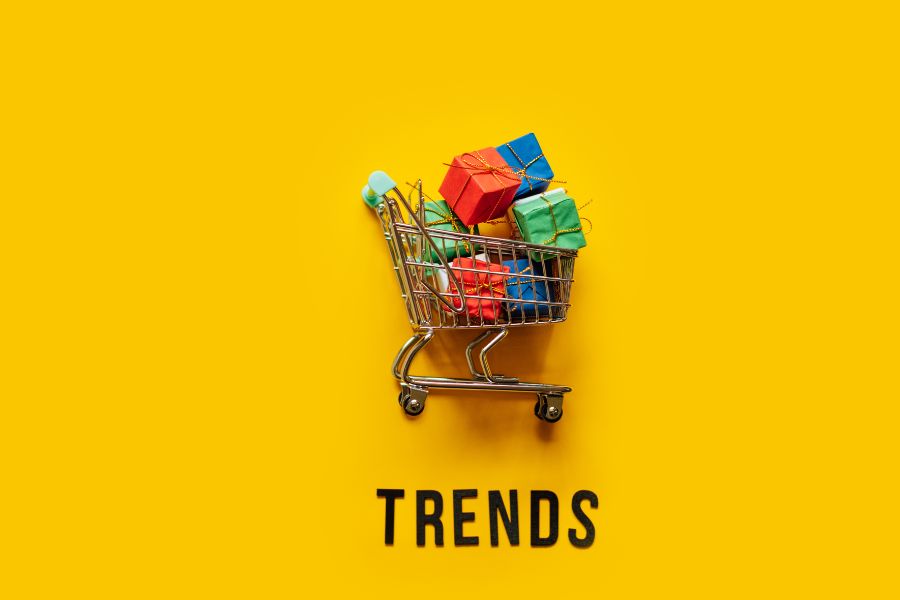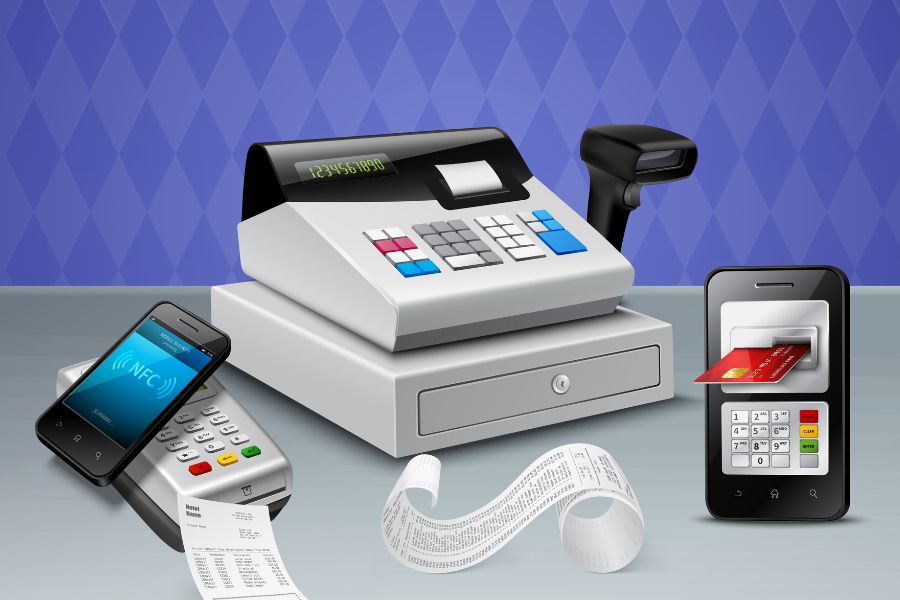What will online shopping look like in 2025? As we approach a new era of innovation, this question becomes increasingly relevant, especially as we reflect on how technology and consumer preferences have redefined the digital marketplace. Predicting the future is no small task but with a close eye on evolving trends and the pulse of consumer behavior. In this blog, we will give 10 online shopping trends in 2025 driving consumer behavior and experience. Now, let’s get discover!
Highlight:
- Personalization, sustainability, and social commerce are reshaping the future of online shopping by aligning consumer preferences with tailored experiences, eco-conscious practices, and interactive buying opportunities.
- Businesses can stay ahead by adopting AI-powered tools, advanced POS systems, and robust omnichannel strategies to meet evolving customer demands seamlessly.
A Look into Online Shopping in 2025
The year 2025 marks a transformative era for online shopping, with the industry projected to surpass $7 trillion globally, growing at an annual rate of 14%.
Innovations in AI and augmented reality (AR) redefine customer experiences, as 73% of online shoppers prefer platforms offering virtual try-ons. A study by Epsilon reveals that 80% of consumers are more inclined to engage with companies that provide personalized experiences.
Mobile commerce is set to dominate, accounting for 72.9% of e-commerce sales as smartphones become integral to the shopping journey. Social commerce, powered by platforms like Instagram and TikTok, is expected to grow by 31% annually, connecting brands with younger audiences.
Sustainability also influences purchasing decisions, with 62% of shoppers prioritizing eco-friendly packaging. As technology advances, online shopping in 2025 seamlessly blends convenience, personalization, and sustainability, shaping the future of retail.
10 Online Shopping Trends Driving Consumer Behavior and Experience in 2025
Looking ahead to 2025, e-commerce is expected to continue evolving rapidly. Consumers are becoming more demanding in their shopping experiences, expecting more personalized, immersive, and efficient interactions with online stores. This transformation is driven by technological advances, changing consumer expectations, and a growing focus on sustainability and ethical practices. We will study 10 online shopping trends to shape consumer behavior and experience in 2025.
Personalization and Hyper-Targeting
Consumers are increasingly expecting personalized shopping experiences fueled by the wealth of data companies have on their preferences and behaviors. By 2025, 80% of customers will be more likely to purchase from brands that offer tailored recommendations, promotions, and experiences.
While AI and machine learning will continue driving hyper-targeting, businesses can also adopt advanced tools like ConnectPOS to achieve efficient and impactful personalization. Beyond its CRM capabilities, ConnectPOS offers features such as detailed customer purchase history tracking and real-time data analysis, empowering businesses to deliver tailored product suggestions, exclusive promotions, and personalized service across all sales channels.
- What you can do: Pair advanced AI tools with solutions like ConnectPOS to deepen your understanding of customer preferences. Use its CRM features to identify trends in purchasing behaviors and target customers with hyper-relevant messaging. Employ personalized recommendations, offers, and content tailored to individual customer profiles for more engaging and effective outreach.
- Example: Amazon and Netflix are prime examples of hyper-targeting, offering tailored recommendations that enhance the user experience, making it easier for customers to discover products and content that match their preferences. These brands lead online shopping trends, illustrating how AI-driven personalization can drive customer engagement and sales.
Immersive Shopping Experiences
Immersive shopping experiences are redefining how consumers interact with brands online. Technologies like Virtual Reality (VR) and Augmented Reality (AR) enable consumers to “try” products before purchasing, providing a more interactive and engaging experience.
- What You Can Do: Investing in AR and VR technologies will enable your store to stand out. Integrating features like virtual product trials or 3D views of clothing and furniture can improve decision-making and reduce return rates. AR and VR can be implemented in apps or e-commerce websites to enhance the shopping experience.
- Example: Customers can visualize how furniture will look in their homes before purchasing on IKEA’s app, while Sephora uses AR to enable customers to try makeup virtually. This trend is only set to grow as consumer expectations for immersive experiences increase.
Sustainability-Driven Choices
Sustainability is no longer just a buzzword but a core concern for modern consumers. In 2025, 62% of shoppers are expected to prioritize eco-friendly packaging and sustainable products. With growing awareness of environmental issues, consumers gravitate toward brands that align with their values and offer sustainable practices.
- What You Can Do: Ensure that your brand embraces sustainability through eco-friendly packaging, carbon-neutral shipping options, and responsible sourcing of materials. Highlight your sustainability efforts through transparent communications on product pages, and seek certifications to build trust with your eco-conscious audience.
- Example: Patagonia is a leader in sustainable retail, offering repair services for clothing and ensuring that its products are made with ethical materials. Similarly, Lush Cosmetics uses minimal packaging and advocates for environmental conservation, appealing to conscious consumers.
Voice Commerce and Conversational AI
Voice commerce is set to grow significantly, with consumers increasingly relying on voice-activated devices like Amazon Alexa, Google Assistant, and Apple Siri to shop online. Conversational AI, including chatbots, enhances customer service by offering instant, personalized responses.
- What You Can Do: Optimizing your store for voice search is crucial. This includes adjusting product listings for voice-friendly queries and ensuring your website is compatible with voice assistants. Moreover, implement conversational AI on your website or mobile app to provide real-time customer support.
- Example: Starbucks allows customers to place orders via voice on Amazon Alexa, simplifying the ordering process.
Faster and Smarter Deliveries
Consumers expect faster, more reliable delivery options, and this trend will continue to dominate the e-commerce landscape. Delivery times are expected to shorten, and the use of AI in logistics to build smarter, more efficient delivery systems.
- What You Can Do: Integrate fast and flexible delivery options into your business model. Partner with reliable logistics providers and consider offering same-day or next-day delivery options to meet growing customer expectations. Leverage AI tools to optimize routes, predict delivery times accurately, and improve overall operational efficiency, aligning with the demand for quicker, smarter deliveries seen in shopping trends.
- Example: Amazon Prime members receive same-day or two-day shipping, setting a high standard for delivery speed.
Social Commerce Boom
Social media platforms are among the online shopping trends that are becoming increasingly important in driving e-commerce sales. In 2025, social commerce will be more prominent, with platforms like Instagram, TikTok, and Facebook enabling users to shop directly through the app.
- What You Can Do: Take advantage of social commerce by integrating e-commerce functions into your social media channels. Post shoppable content and use social proof, such as reviews and user-generated content, to influence purchasing decisions.
- Example: Instagram Shopping allows users to purchase products directly from posts and stories, streamlining the shopping process.
Improved Payment Flexibility
Consumers now expect diverse, flexible payment options. In 2025, contactless payments, digital wallets, and BNPL (buy now, pay later) services will be more widespread, offering consumers greater convenience and choice at checkout. Offering a wide range of payment methods can enhance the customer experience.
- What You Can Do: Equip your e-commerce platform with tools that support various payment methods, such as ConnectPOS. With ConnectPOS, businesses can integrate smoothly with leading payment gateways and offer flexible options, including digital wallets and BNPL services. ConnectPOS also provides real-time payment synchronization across physical and online channels, creating a unified transaction experience for customers, whether they’re shopping in-store or online.
- Example: Many retailers, including Target and Walmart, accept various payment methods, from digital wallets to BNPL services like Afterpay and Klarna, offering flexibility to cater to a broader audience.
AI-Powered Customer Support
It’s no surprise that AI made it on our list. By 2025, AI will be deeply integrated into customer service operations, providing instant responses to customer inquiries and offering personalized support 24/7.
- What You Can Do: Implement AI chatbots on your website to provide real-time assistance. Ensure your customer service tools are AI-powered, offering personalized recommendations and resolving issues without human intervention when possible.
- Example: Sephora’s chatbot provides personalized beauty advice and helps customers book in-store appointments.
Rise of Subscription Models
Subscription models are increasingly popular, providing convenience and personalized experiences for consumers. By 2025, the subscription e-commerce sector is projected to exceed $478 billion, with key industries such as beauty, food, and entertainment at the forefront way.
- What You Can Do: Consider offering subscription services for consumables or curated product boxes. Subscriptions can increase customer loyalty and provide a steady revenue stream. Ensure that your platform allows easy management of subscriptions, with features like pause, skip, or cancel options.
- Example: Birchbox offers a subscription model for beauty products, providing customers with curated selections based on their preferences.
Data Privacy and Ethical Practices
As consumers become more aware of data privacy concerns, ethical practices around data collection and usage will become increasingly important within the realm of online shopping trends. In 2025, customers will prioritize businesses that respect their privacy and adhere to ethical standards, making data security a critical factor in shaping consumer behavior.
- What You Can Do: Ensure that your business complies with data privacy regulations like GDPR and CCPA. Be transparent about your data collection practices and give customers control over how their information is used. Communicate your ethical practices clearly to build trust with your audience.
- Examples: Apple is known for its strong stance on privacy, offering users the option to limit tracking across apps.
FAQs: Online Shopping Trends
- How will consumer behavior change in 2025?
Consumer behavior in 2025 will prioritize personalization, sustainability, faster delivery, and immersive shopping experiences through advanced technologies.
- What technological advancements will define online shopping in 2025?
Key advancements include AI-powered personalization, augmented reality (AR), voice commerce, faster deliveries, and smarter payment solutions like digital wallets.
- Is augmented reality (AR) a game-changer for online retail?
Yes, AR enhances online retail by offering immersive, interactive experiences, allowing consumers to visualize products before purchasing.
Conclusion
In conclusion, the future of online shopping trends in 2025 is shaped by personalization, sustainability, immersive experiences, and innovative technologies like AI and AR. These trends are redefining how consumers shop and interact with brands.
To stay ahead, businesses can leverage solutions like ConnectPOS for seamless, flexible payment systems. Contact us today to learn more!



